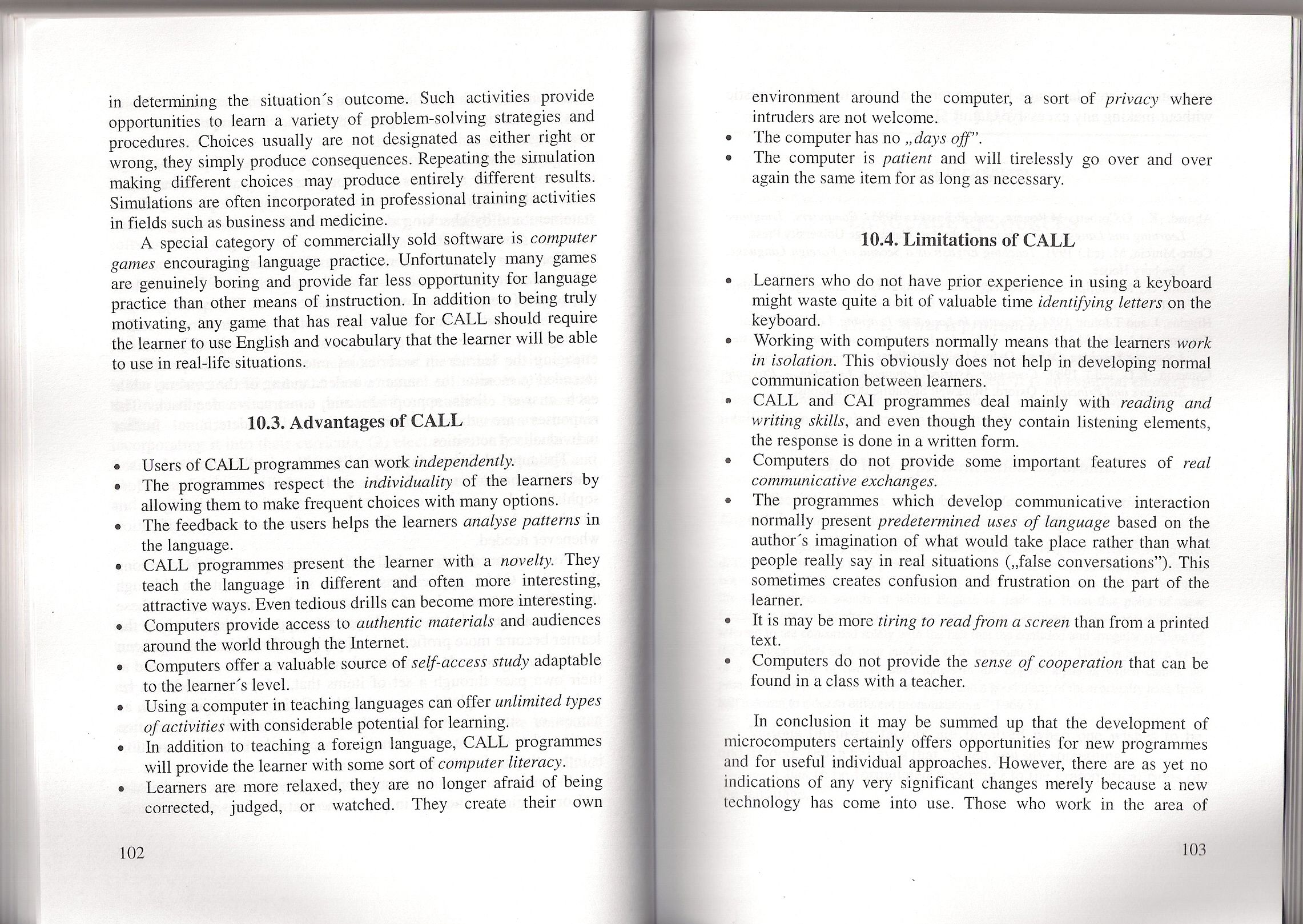82976 skanowanie0051 (9)

in determining the situation's outcome. Such activities provide opportunities to learn a variety of problem-solving strategies and procedures. Choices usually are not designated as either right or wrong, they simply produce conseąuences. Repeating the simulation making different choices may produce entirely different results. Simulations are often incorporated in professional training activities in fields such as business and medicine.
A special category of commercially sold software is Computer games encouraging language practice. Unfortunately many games are genuinely boring and provide far less opportunity for language practice than other means of instruction. In addition to being truły motivating, any gamę that has real value for CALL should reąuire the leamer to use English and vocabulary that the leamer will be able to use in real-life situations.
10.3. Advantages of CALL
• Users of CALL programmes can work independently.
• The programmes respect the individuality of the learners by allowing them to make freąuent choices with many options.
• The feedback to the users helps the learners analyse patterns in the language.
• CALL programmes present the leamer with a novelty. They teach the language in different and often morę interesting, attractive ways. Even tedious drills can become morę interesting.
• Computers provide access to authentic materials and audiences around the world through the Internet.
• Computers offer a valuable source of self-access study adaptable to the leamer's level.
• Using a Computer in teaching languages can offer unlimited types ofactmties with considerable potential for leaming.
• In addition to teaching a foreign language, CALL programmes will provide the leamer with some sort of Computer literacy.
• Learners are morę relaxed, they are no longer afraid of being corrected, judged, or watched. They create their own environment around the Computer, a sort of privacy where intruders are not welcome.
• The Computer has no „days ojf”.
• The Computer is patient and will tirelessly go over and over again the same item for as long as necessary.
10.4. Limitations of CALL
• Learners who do not have prior experience in using a keyboard might waste quite a bit of valuable time identifying letters on the keyboard.
• Working with computers normally means that the learners work in isolation. This obviously does not help in developing normal communication between learners.
• CALL and CAI programmes deal mainly with reading and writing skills, and even though they contain listening elements, the response is done in a written form.
• Computers do not provide some important features of real communicative exchanges.
• The programmes which develop communicative interaction normally present predetermined uses of language based on the author's imagination of what would take place rather than what people really say in real situations („false conversations”). This sometimes creates confusion and frustration on the part of the leamer.
• It is may be morę tiring to readfrom a screen than from a printed text.
• Computers do not provide the sense of cooperation that can be found in a class with a teacher.
In conclusion it may be summed up that the development of microcomputers certainly offers opportunities for new programmes and for useful individual approaches. However, there are as yet no indications of any very significant changes merely because a new technology has come into use. Those who work in the area of
103
Wyszukiwarka
Podobne podstrony:
THE ROLE OF THE PRIMARY ENERGY FACTOR IN DETERMINING THE ENERGY PERFORMANCE OF BUILDINGS _Policy Bri
216 Z. Święcicka Abstract In project control precision it is very important in determining the plann
Achieue your indiuidual goals in muli The project deals with a software system designed to lmprove m
42ECONOMIC JPRS-EER-91-053 25 Apri! 1991 scrious the situation is. Grain cannot be exported to the S
INTRODUCTION Term of information is in our civilization so broad that it is impossible to expect a d
weather 1 The car was stock in a blizzard. 2 The sky was ouercast and ithad begun to sleet. 5 The wi
UNIVF.RSITY OP WARSAW WAR SAW As an UW student, in the futurę you will have an opportumty to
a distinctive colour tint can be applied to the erosion surface. This is better restricted to elear
dpp69 THE IRON SHOE STRENGTH BUILDER HAS proven to bc one of the most popular strength bmlding devic
Expand Your HorizonsA Galleiy of Stone Animals The ptcvious cłupcen havc shown you hosr to eteate 3&
Exercises class Description: The aim of this course is to provide an opportunity to develop skills o
skanowanie0044 (8) and will subseąuently be used during the role-playing in the context of the situa
więcej podobnych podstron